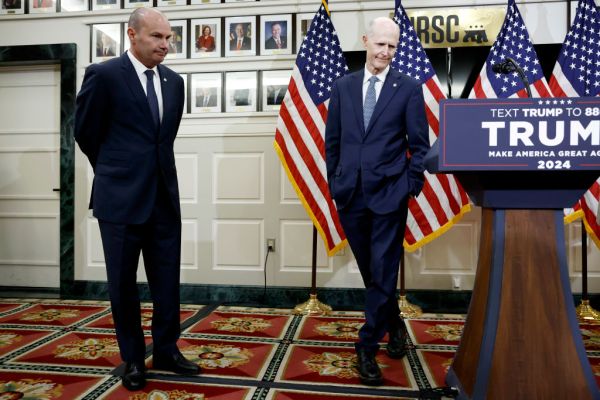Social Security made one of its periodic returns to prominence in the midterm elections, as Democrats accused Republicans of plotting to cut (or end) the underfunded federal retirement program. But why is this even an issue? Why has Congress waited four decades to fix Social Security, when common sense says it’s easier to act sooner than later? The answer is that common sense is wrong: Americans nearing retirement have played a game of chicken with Congress for decades, refusing to support the additional taxes needed to keep Social Security solvent while daring their representatives to cut their benefits when Social Security’s trust fund runs out in 2035.
Older Americans will almost certainly win that game, since neither political party has the will to cut Social Security. The reality is that reform of Social Security and other long-term programs are in the hands of both citizens and politicians who benefit precisely from not reforming them.
Since the mid-1980s, Americans have been told that, lacking additional revenues, Social Security will be unable to pay full benefits past the mid-2030s. By 1992, Social Security’s trustees urged that “appropriate options to strengthen the long-range financing of the program should be developed.” Presidents Bill Clinton and George W. Bush both tried to reform Social Security. And yet, nearly 40 years and more than $20 trillion of unfunded benefit obligations later, nothing has been done.
Early action would spread tax increases or benefit cuts over multiple generations, making reform less painful and economically harmful than lumping all the changes on a single group of Americans.
However, Social Security policy is governed by Americans wishing to benefit not all generations but mostly their own. If a future Congress will not cut Social Security benefits, then present taxpayers rationally should oppose raising taxes to fund those benefits. And historically they have: In 2005, for instance, only 37 percent of Americans supported raising Social Security’s 12.4 percent payroll tax rate. Politicians similarly benefit by dodging Social Security’s $20 trillion funding shortfall: Why take a political hit for advocating unpopular reforms when you can pass the problem on to a future Congress?
An average-wage worker retiring in 2035 will have saved nearly $125,000 in payroll taxes relative to the higher tax rates that would have maintained Social Security’s long-term solvency. A worker earning the maximum salary subject to Social Security payroll taxes—$162,200 in 2023—will have saved more than $350,000. Delaying Social Security reform pays real dividends, so long as benefits won’t be cut when the trust funds run dry.
And neither Republicans nor Democrats are likely to call retirees’ bluff. Nine-in-ten House Democrats have co-sponsored legislation boosting benefits across the board, including for the rich and including for current retirees. And, election-year scare-tactics notwithstanding, congressional Republicans show little appetite for reducing Social Security. Former President Donald Trump opposed any Social Security cuts. Sen. Josh Hawley, angling to be Trump’s heir, argues that Republicans should abandon any “fiddling” with Social Security.
And when Republicans had the chance to either cut or reform Social Security disability benefits in 2016, when that program’s trust fund was running dry, they instead ducked the issue by transferring funds from the Social Security retirement program. If even Republicans won’t reduce benefits with decades of forewarning, what is the chance they will enact an overnight 20 percent across-the-board cut when the trust fund is exhausted in 2035?
Of course, delaying Social Security reform does not make its costs disappear. It just makes those costs more expensive. Come 2035, working-age Americans will pay $350 billion annually on top of their existing payroll taxes to fund Social Security benefits that seniors insist they “earned” yet never got around to fully paying for. The same dynamic holds for Medicare and, at the state and local government level, public employee pensions that are underfunded to the tune of $4.5 trillion. Reluctance to either raise taxes or reduce benefits makes these programs a great financial deal for past and present retirees but, like a see-saw, an equal and opposite poor deal for future Americans.
The solution, at least for Social Security, is to require annual, automatic adjustments to the program to maintain long-term funding health, just as federal law requires of private sector pensions. Each year, Social Security’s actuaries would estimate the plan’s funding shortfall and, automatically, payroll taxes would increase or future benefits be reduced to address it. Even if we disagree about whether to balance Social Security by tax increases or benefit cuts, future generations benefit if we stop current generations’ decades-long strategy of foisting the bill onto their children and grandchildren.








Please note that we at The Dispatch hold ourselves, our work, and our commenters to a higher standard than other places on the internet. We welcome comments that foster genuine debate or discussion—including comments critical of us or our work—but responses that include ad hominem attacks on fellow Dispatch members or are intended to stoke fear and anger may be moderated.